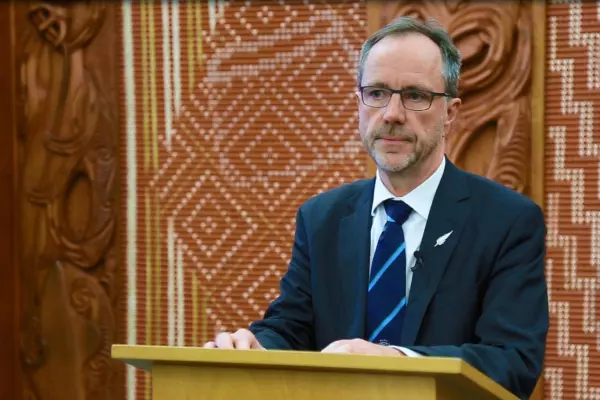A new online system meant to speed up visa processing was brought online before it was ready, say users.
BusinessDesk has received multiple reports that the system, known as “Adept”, is delaying visa applications for no apparent reason and requesting medical checks even when these have been provided.
During covid, many Immigration NZ (INZ) staff were unable to efficiently process applications while working from home, resulting in pressure to get what was a paper-based system online as quickly as possible.
Since the border was reopened, there has been a surge in visa applications, especially for short-term visitors.
According to figures supplied by immigration minister Michael Wood, there were 77,000 applications for visitor visas between Aug 1 and Oct 12, of which 47% were still awaiting a decision on Oct 12.
Of the 41,000 that were issued, it took an average of two weeks to make a decision.
However, it took seven weeks before 90% of the completed applications had been decided.
Inevitable, but avoidable
Immigration adviser David Cooper confirmed that his firm Malcolm Pacific was among those experiencing issues with Adept. He reported visa applications becoming “stuck” in the system, but also errors such as the wrong date of birth being put on visas.
Cooper said: “To be fair, the new online system is working well overall”, but there were ongoing issues which could have been sorted out if there had been more in-depth testing with high-volume users before it went live.
Cooper points the finger at a lack of resources being given to Immigration New Zealand, comparing it to the Inland Revenue Department, which was given $1.5 billion to redevelop its IT system over a decade.
“The IRD system works really well – I know because I have to log in and use it all the time," he said.
“INZ had too much thrown at them by government to roll out new visa policies alongside new IT platforms and the border opening.
“Everyone is now wondering why there are delays with visa applications. These dramas were inevitable but avoidable.”
Scooping them out
IMMagine’s Iain MacLeod told BusinessDesk medical checks were now causing processing of “straightforward” visas to be delayed for several months.
He said historically the checks were filed with applications, but now approved doctors have been instructed not to do any medicals until an “HR number” is issued, adding weeks to the time it takes to get an appointment.
Even when the medical reports are uploaded into Adept, it will still come back several weeks later requesting a medical check.
“We say, you’ve already got it, and they have a team of people who somehow go into the system, find them, and scoop them all out.”
Live experiment?
Another industry source, who preferred not to be named, said they had visitor visa applications dating back to August stuck in the system. Which applications were processed seemed to be quite random.
They understood INZ was now manually transferring some applications to another system so they could be processed.
They said the rollout of Adept was like a “live experiment” and the system had very quickly been dubbed “Inept” by users.
Nicola Tiffen, chair of the NZ Association for Migration and Investment, said the disruptions caused by Adept were of significant concern to her organisation's members.
“The ongoing issues have negatively affected our ability to provide clients with a good service and we are very concerned as to how applicants who are not represented have fared.”
Tiffen said she was grateful INZ was working hard to resolve issues, but wondered if the system was designed to take on the volume of applications at this stage of its development process.
“Perhaps too much has been asked, at a government level, of the new system.”
Blame the parents?
An INZ spokesperson attributed the recent problems to applications for parent visitors and grandparent visitor visas, received between Aug 1 and Sept 21, which had not “progressed through the platform as expected”.
They said some applicants chose the parent and grandparent visas when the general visitor category may have suited them better.
“This issue has now been addressed with clearer guidance provided for applicants.”
Regarding requests for health checks, some applications also “did not progress as expected” but a system fix should work for applications made after Sept 22.
To speed up affected applications, INZ is now processing them as general visitors, which involved moving them out of the online system.
"As Immigration Online beds in, INZ is continually improving functionality for a better user experience," said the spokesperson.
Close eye
Ministers have been keeping a close eye on how INZ puts the government's flagship “immigration rebalance” policy in place, and how it manages the reopening of the border.
INZ set up a visa processing “taskforce” in July to explore processing efficiencies, but this was soon replaced by an incident management team (IMT) on the recommendation of a unit of government overseers that reports directly to deputy prime minister Grant Robertson.
These overseers, known as the Implementation Unit, carried out a “rapid assessment” of the immigration rebalance and INZ’s contingency and planning approach to visa processing for the border reopening.
An INZ spokesperson said processing rates had improved because of temporary measures and progress has also been made on improving contingency planning should visa processing slow again due to seasonal peaks, staffing levels or system-related matters.
“As part of the wider contingency planning effort, a visa prioritisation tool and extensive demand-versus-supply forecasts are being developed for integration back into the business.”














